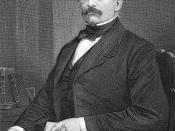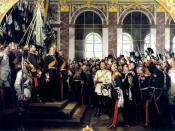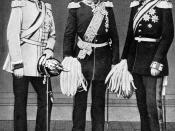German Unification is believed to be, by some, the most significant achievement of mid-nineteenth century nationalists, where the divided states of Germany joined into the German Empire. For years before unification the powerful neighbors of Germany had worked to keep her divided. Then in 1871 conditions occurring in Europe allowed King William 1 of Prussia, his chief minister Otto Van Bismarck, and his General Chief of Staff, Helmuth von Moltke to act, bringing together the German states into a single unit, however this single unit was excluding Austria who was not to be part of the Unification of the German States. Bismarck, in many of his speeches took much pride in his belief that "blood and iron"ÃÂ alone would be the only way to unify Germany, and in his memoirs, written 25 years after the events, he stated that it was "WAR NOTHING MORE NOTHING LESS"ÃÂ i.e. the three wars of the 1860's which alone led to German Unification.
(the Russo-Danish war, The Austro-Prussian war and the Franco Prussian War). On the other hand, economists and a lot of historians believe that it was "coal and iron"ÃÂ which united Germany in 1871, other than "blood and Iron"ÃÂ. It was JM Keynes, an economist who said that "coal and iron"ÃÂ were the main factors in gaining a United Germany was work and the growth of economic strength.
In 1862 Bismarck became Prussian Minister President and was determined to unite Germany under the hegemony of the conservative, in other words a united Germany with anti-liberal monarchy. Bismarck liked the idea of a united Germany because it meant Prussia would be strengthened and the liberals could be stopped. Bismarck's loyalty lay with the Prussians because, he was a Prussian Himself. Bismarck hated liberalism, democracy and socialism, although he used these charismatic qualities...


